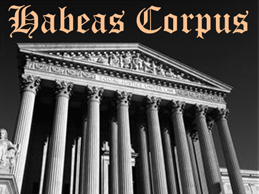How a Lawyer Can Assist With Your Habeas Corpus Application
How a Lawyer Can Assist With Your Habeas Corpus Application
Blog Article
Recognizing the Duty of a Post-Conviction Legal Representative in Looking For Justice After a Criminal Conviction
In the complex landscape of post-conviction legal proceedings, the role of a post-conviction lawyer is pivotal in browsing the course to justice after a criminal conviction. Beyond the confines of a test, these attorneys participate in a multifaceted strategy focused on discovering new proof, tough lawful errors, and advocating for their customers' legal rights. The ins and outs of post-conviction job need a blend of lawful acumen, investigatory skills, and strategic believing to untangle the complexities of an instance and go after avenues that might have been neglected or underexplored. As the pursuit of justice expands beyond the boundaries of preliminary proceedings, the duty of a post-conviction attorney emerges as a sign of expect those seeking to fix oppressions and recover their rights within the legal system.
Post-Conviction Legal representative's Investigatory Job
Post-conviction attorneys participate in thorough investigatory work to uncover brand-new evidence, procedural mistakes, or misbehavior that could possibly cause reversing a conviction. This investigatory stage is vital in the post-conviction procedure as it aims to recognize any type of neglected information or lawful mistakes that may have impacted the result of the first test. Post-conviction lawyers look into instance data, witness testimonies, and lawful documentation with a fine-tooth comb, looking for any type of disparities or abnormalities that might be premises for charm.
Through thorough examination, post-conviction attorneys aim to shed light on prospective injustices that might have occurred throughout the original trial. By inspecting every aspect of the legal proceedings, post-conviction attorneys function relentlessly to uncover any type of factors that might have influenced the verdict.
Crafting Appeals and Petitions
In the quest of justice after a sentence, proficient lawyers carefully craft charms and requests to existing engaging arguments for the reconsideration of legal choices. Crafting charms and applications needs a deep understanding of the lawful system, attention to detail, and tactical reasoning. Post-conviction legal representatives evaluate trial documents, recognize possible mistakes or offenses of civil liberties, and establish legal disagreements to challenge the conviction or sentence.
When crafting an allure, legal representatives concentrate on highlighting lawful errors that may have affected the end result of the instance. They investigate situation law, statutes, and lawful criteria to support their arguments. Applications, on the various other hand, may involve presenting brand-new evidence that was not available throughout the test or demonstrating changes in the regulation that necessitate an evaluation of the conviction.
Moreover, post-conviction legal representatives need to adhere to strict step-by-step guidelines and deadlines when submitting charms and petitions. They have to provide their disagreements clearly and persuasively to encourage the court to approve relief to their customers. Via careful crafting of charms and petitions, post-conviction legal representatives aim to protect justice for individuals that have been wrongfully founded guilty or unfairly punished.

Pursuing Post-Conviction Relief
Seeking relief after a sentence needs a strategic and thorough approach by seasoned legal specialists. Post-conviction relief includes a variety of legal devices designed to challenge the legitimacy of a conviction or sentence (west virginia federal habeas corpus attorneys). These avenues consist of submitting movements for a brand-new trial, pursuing allures, looking for writs of habeas corpus, and providing recently discovered proof. Post-conviction legal representatives play a crucial duty in browsing these complicated procedures, ensuring that all lawful alternatives are checked out to correct injustices that might have taken place throughout the test or sentencing phase.
One common kind of post-conviction relief is filing an application for post-conviction alleviation, typically based upon claims of inefficient support of guidance, prosecutorial misconduct, newly discovered evidence, or constitutional offenses. These applications call for a comprehensive analysis of the test document, legal research, and persuasive advocacy to persuade the court to provide alleviation. Experienced post-conviction attorneys have the skills and knowledge required to identify viable lawful claims, carry out examinations, and present compelling disagreements to safeguard alleviation for their clients. By carefully seeking post-conviction relief, these legal specialists aim to deal with miscarriages of justice and support the concepts of justness and due procedure in the criminal justice system (Lawyer).
Using Forensic Proof
When challenging a conviction or sentence, the critical utilization of forensic evidence can be an effective device in post-conviction lawful process. Forensic proof incorporates a large range of clinical methods utilized to examine criminal offenses and establish realities in court. Post-conviction legal representatives can utilize forensic proof to challenge the validity of sentences by offering brand-new clinical findings that were not available throughout the initial trial.

Engaging in Sentence Adjustments
Post-conviction attorneys may check out the possibility of sentence modifications as a legal avenue to address disproportionate or unfair sentences bied far in criminal cases. Sentence alterations include seeking adjustments to the terms of an accused's sentence after a conviction has occurred. These modifications can include minimizing the size of a sentence, changing the kind of penalty enforced, or exploring alternative sentencing choices.
Post-conviction attorneys can pursue sentence adjustments via numerous lawful systems, such as filing motions for sentence decrease, appealing for caring release, or negotiating appeal offers for decreased sentences. They must carefully assess the situations of the instance, examine the legal premises for seeking an adjustment, and present compelling arguments to the court supporting the need for a revised sentence.
Taking part in sentence modifications needs a complete understanding of criminal legislation, sentencing standards, and the details treatments included in seeking post-conviction alleviation. Post-conviction attorneys play a vital role in advocating for reasonable and simply end results by tough sentences that are unduly harsh or do not align with the principles of justice.
Final Thought
In verdict, the role of a post-conviction attorney hop over to here is important in looking for justice after a criminal conviction. Through investigatory job, crafting charms and applications, seeking post-conviction alleviation, using forensic evidence, and engaging in sentence adjustments, these attorneys play an important function in supporting for their customers and making certain that their civil liberties are promoted within the criminal justice system. Their devotion and proficiency are important in browsing the intricacies of post-conviction process and attaining a reasonable outcome for individuals facing criminal sentences.
Report this page